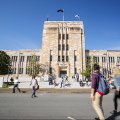Banning biker gangs and criminalising membership of outlaw motorcycle groups will not be an effective way to combat organised crime says legal expert Dr Andreas Schloenhardt of UQ’s TC Beirne School of Law.
Dr Schloenhardt’s comments come in response to the tough stance on motorcycle gangs promised by Queensland Premier Campbell Newman following a suspected gang-related shooting at the Robina Town shopping centre on the Gold Coast last weekend.
Mr Newman has indicated that the State Government may attempt to ban biker gangs through the controversial, but as yet unused, Criminal Organisations Act, introduced by the former Labor Government in 2009.
“The Criminal Organisations Act 2009 (Qld) permits the Queensland Police Commissioner to apply to the Supreme Court for a declaration of an organisation,” Dr Schloenhardt explained.
“This declaration enables the Government to effectively ban the organisation and place persons associated with it under a control order, thus severely restricting their movements and civil liberties.”
Dr Schloenhardt says similar attempts to ban the Finks Motorcycle Club in South Australia and the Hells Angels in New South Wales backfired when the High Court declared relevant provisions invalid in 2010 and 2011.
“While the Queensland Act is more balanced than the former laws in South Australia and NSW, there are serious doubts whether it will be able to disrupt and restrict biker gangs and their activities,” he said.
As a highly respected researcher in the field of organised crime, Dr Schloenhardt has consulted for the United Nations Office on Drugs and Crime (UNODC) and the Australian Federal Police, and works in a training capacity with several law enforcement agencies.
He has also published extensively on the law and effects of organised crime, including, outlaw motorcycle gangs and the illegal drug trade.
In his experience Dr Schloenhardt believes that the declaration of organisations and imposition of control orders may disperse some criminal organisations and cause some groups and individuals to suspend their activities and/or relocate in the short term, but may exacerbate the problem in years to come.
“The long-term effects of the legislation are not predictable and may not be desirable,” he said.
“If the experience with similar laws abroad is anything to go by, it is highly likely that many groups will reduce public displays of insignia and instead meet and operate more clandestinely leading to further consolidation and growth of powerful groups, more violent turf wars, and ultimately, a restricted ability for police informants to penetrate these groups.”
According to Dr Schloenhardt, neither the Act, nor other measures proposed by the Premier, will be effective in closing down the lucrative illegal drug trade in which some biker gangs and other criminal elements are involved.
“The legislation may marginally change some of the players and playgrounds of Queensland’s organised crime scene, but it does not take away the incentive to engage in these markets,” he said.
Media information:
Dr Andreas Schloenhardt, TC Beirne School of Law, 07 336 5619 a.schloenhardt@law.uq.edu.au
Melissa Reynolds, School of Law Marketing, 07 3365 2523, m.reynolds@law.uq.edu.au
.jpg)










